Featured
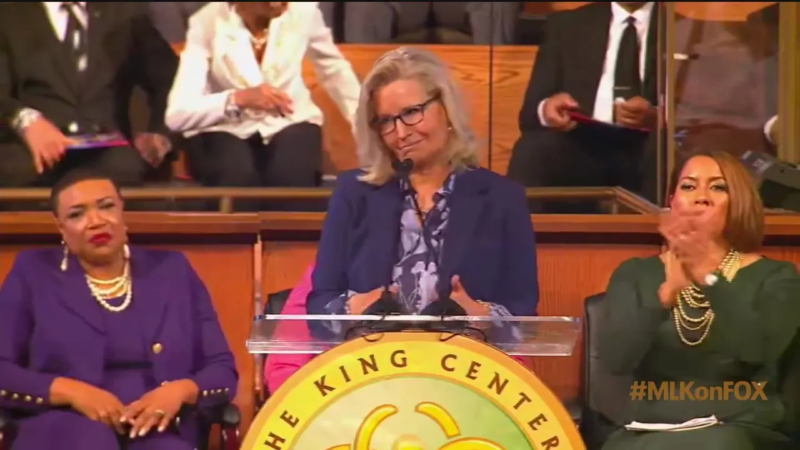 Liz Cheney Receives Standing Ovation in Atlanta’s Ebenezer Baptist Church As She Warns of Dire Threat From Trump. By Alex Griffing / Mediaite
Liz Cheney Receives Standing Ovation in Atlanta’s Ebenezer Baptist Church As She Warns of Dire Threat From Trump. By Alex Griffing / Mediaite
Ex-Rep. Liz Cheney (R-WY) addressed the Ebenezer Baptist Church in Atlanta on Monday during a commemoration of Martin Luther King Jr. on MLK Day.
“I have never been more honored by any invitation than I was when Dr. Bernice King called and invited me to be here at Ebenezer Baptist Church—in perhaps the most significant pulpit in this great nation of ours—with all of you this morning to honor the life and work of Dr. Martin Luther King, Jr.,” Cheney began as she discussed Dr. King’s legacy and eventually turned to the 2024 GOP primary.
“As we meet this morning, a great lie is doing its work poisoning the bloodstream of our democracy. A former president refuses to acknowledge he lost and has convinced millions that our election and our democracy no longer work,” Cheney declared,. Read more
Related: With Trump’s win, Liz Cheney and anti-MAGA GOP voters face a choice. By Jennifer Rubin / Wash Post
Related: The Ruin That a Trump Presidency Would Mean. By David Frum / The Atlantic
Political / Social
 Nikki Haley, MAGA and the Confederacy: Time to purge these myths. By Rich Logis / Salon
Nikki Haley, MAGA and the Confederacy: Time to purge these myths. By Rich Logis / Salon
As a former MAGA activist, I know how deep the racial panic and trauma go. Nikki Haley knows that too
Nikki Haley is not a racist. She showed formidable leadership as South Carolina governor, in the aftermath of the 2015 mass shooting at Emanuel African Methodist Episcopal Church in her state. But as a former MAGA activist now working to persuade people to leave the MAGA movement, I see Haley’s recent comments on the Civil War and slavery in a particular light. They reflect the intense white fright pervasive in MAGA supporters as a result of continuous demographic change, and they affirm that a demythologization of historical nostalgia is necessary. Read more
Related: What Nikki Haley — and I — Learned at a Segregation Academy. By Elizabeth Spiers / NYT
Related: Haley’s politically useful denial of America’s racist past. By Phillip Bump / Wash Post
 The U.S. Lacks What Every Democracy Needs. By Robert Hasen / NYT
The U.S. Lacks What Every Democracy Needs. By Robert Hasen / NYT
Unlike the constitutions of many other advanced democracies, the U.S. Constitution contains no affirmative right to vote.
We have nothing like Section 3 of the Canadian Charter of Rights and Freedoms, providing that “every citizen of Canada has the right to vote in an election of members of the House of Commons or of a legislative assembly and to be qualified for membership therein,” or like Article 38 of the Basic Law of the Federal Republic of Germany, which provides that when it comes to election of the Bundestag, “any person who has attained the age of 18 shall be entitled to vote.” Read more
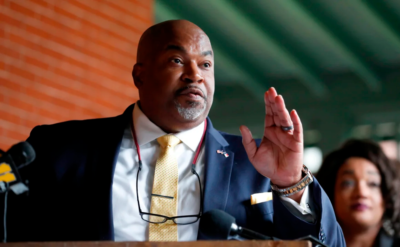 Mark Robinson: GOP front-runner for North Carolina governor supported banning abortions without exceptions. Now he avoids using the ‘a-word.’ By and
Mark Robinson: GOP front-runner for North Carolina governor supported banning abortions without exceptions. Now he avoids using the ‘a-word.’ By and
North Carolina Lt. Gov. Mark Robinson, the state’s second highest-ranking elected official and its leading Republican candidate for governor in 2024, once hailed banning abortion as his top priority, advocating for its complete ban without exceptions.
Robinson is no stranger to controversy. As CNN’s KFile previously reported, he mocked and attacked the Parkland school shooting survivors. The Greensboro native also attacked the Civil Rights movement, lamenting that “so many freedoms were lost,” and criticized the historic Woolworth lunch counter sit-in protests in 1960 that originated in his hometown. Read more
 The Assault on DEI. By Staff / The Chronicle of Higher Education
The Assault on DEI. By Staff / The Chronicle of Higher Education
Republican politicians in early 2023 launched an assault on colleges’ diversity, equity, and inclusion efforts to recruit and retain faculty and students of color.
While college administrators say their so-called DEI efforts are an effective strategy to repair decades of exclusionary policies and practices that repelled communities of color from their campuses, Republican leaders say the practices violate free speech, break antidiscrimination laws, and are a misuse of public money. Read more
Related: The Backlash Against DEI – The Assignment with Audie Cornish – Podcast on CNN Audio.
 An HBCU administrator died by suicide. The school’s president is now on leave. By Alia Wong / USA Today
An HBCU administrator died by suicide. The school’s president is now on leave. By Alia Wong / USA Today
A historically Black college and university is mourning the death of one of its former administrators, and some alumni say racism was at play and the institution’s president is to blame.
Antoinette “Bonnie” Candia-Bailey was the vice president of student affairs at Lincoln University of Missouri, an HBCU in Jefferson City. Candia-Bailey, who was Black, died by suicide on Monday. According to Sherman Bonds, the president of Lincoln’s National Alumni Association, she’d recently been fired. Read more
 Florida Dollar General reopens months after the racially motivated killing of 3 Black people. By AP
Florida Dollar General reopens months after the racially motivated killing of 3 Black people. By AP
A Dollar General store where three Black people were killed during a racially motivated shooting last summer reopened Friday morning in a northeast Florida community where it is among only a few stores selling fresh food to nearby residents.
Nearly five months after the Aug. 26 shooting, memorials dedicated to victims Jerrald Gallion, Anolt “A.J.” Laguerre Jr. and Angela Carr remained outside the New Town Dollar General store in Jacksonville, still decorated with photos, flowers and stuffed animals. Read more
 Can $3 billion persuade Black farmers to trust the Agriculture Department? By Amy Mayer / NPR
Can $3 billion persuade Black farmers to trust the Agriculture Department? By Amy Mayer / NPR
The Biden administration is spending $3.1 billion to convince farmers and ranchers to reduce greenhouse gas emissions and sequester carbon in the ground.
It also hopes that the Partnerships for Climate-Smart Commodities grants will help make amends for a century of systemic discrimination by the U.S. Department of Agriculture (USDA) against Black, Native and other “historically underserved” farmers. Read more
Ethics / Morality / Religion
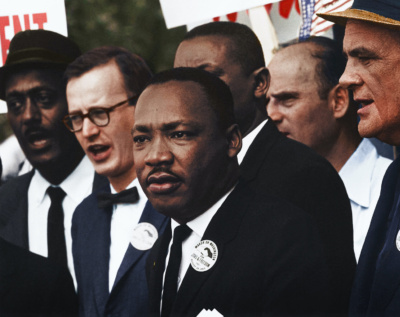 We need Martin Luther King’s vision of Christian nationalism. By Michael Sean Winters / NCR
We need Martin Luther King’s vision of Christian nationalism. By Michael Sean Winters / NCR
King’s vision was a vision of brotherhood, justice and freedom. Each of those characteristics were, for him, rooted and understood equally as Christian and American. King grasped the theological consequences of the Incarnation, the need to inculturate faith, and that part of that inculturation meant informing our politics and our sense of national identity in the light of our faith.
King understood, too, that both the American creed and the Christian creed required a belief in the idea that race, ideology and culture could be transcended. Not obliterated, but transcended. This belief set him apart from so many religious, political and cultural leaders who have followed him. They follow the Herderian idea that cultures are incommensurable. King knew about Pentecost. Read more
Related: Martin Luther King Jr. Wasn’t a Lone Messiah. By Joy-Ann Reid / NYT
 The Deification of Donald Trump Poses Some Interesting Questions. By Thomas B. Edsall / NYT
The Deification of Donald Trump Poses Some Interesting Questions. By Thomas B. Edsall / NYT
On Oct. 15, 2020, in a rare display of humility, Donald Trump told a campaign rally in Greenville, N.C., that he was not as famous as Jesus Christ.
“Somebody said to me the other day, ‘You’re the most famous person in the world, by far.’ I said, ‘No, I’m not.’ They said, ‘Yes, you are. I said no.’ They said, ‘Who’s more famous?’ I said, ‘Jesus Christ.’”This exhibition of modesty was out of character. Trump, his family and his supporters have been more than willing to claim that Trump is ordained by God for a special mission, to restore America as a Christian nation. In recent weeks, for example, the former president posted a video called “God Made Trump” on Truth Social that was produced by a conservative media group technically independent of the Trump campaign. He has also screened it at campaign rallies. Read more
 Does the Constitution depend on morality and religion? By Mark Silk / RNS
Does the Constitution depend on morality and religion? By Mark Silk / RNS
A cautionary tale from John Adams.
At the end of his latest lament for the MAGA makeover of American evangelicalism, New York Times columnist David French turns to President John Adams’ 1798 letter to the Massachusetts militia, which he calls “a critical founding document.” That’s because it contains some lines that, French notes, evangelicals (including him) love to quote. “Our Constitution was made only for a moral and religious People,” wrote Adams. “It is wholly inadequate to the government of any other.” Was he right? Read more
 Dozens of Black churches receive total of $4 million for historic preservation. By Adelle M. Banks / RNS
Dozens of Black churches receive total of $4 million for historic preservation. By Adelle M. Banks / RNS
Thirty-one Black churches have received a total of $4 million to help preserve their buildings and the Black history they represent.
The National Trust for Historic Preservation announced the second round of Preserving Black Churches grants from its African American Cultural Heritage Action Fund on Monday (Jan. 15), the national holiday honoring the Rev. Martin Luther King Jr. Along with the funds provided last year, the Action Fund has supported more than 70 historic churches with $8.7 million in grants. Read more
Historical / Cultural
 Confederate monuments spark debate about history. By Kiara Alfonseca / ABC News
Confederate monuments spark debate about history. By Kiara Alfonseca / ABC News
Over 2,000 Confederate memorials are still in place across the country.
More than 60 years after Martin Luther King Jr. uttered ‘Let freedom ring from Stone Mountain of Georgia,’ racial and historical tensions continue to boil over at Stone Mountain, which doubles as the home of the largest Confederate monument in the world and the Ku Klux Klan’s 20th-century rebirth. Stone Mountain is one of more than 2,000 Confederate memorials still in place across the country, according to the legal advocacy group Southern Poverty Law Center (SPLC). This list includes monuments, plaques, street and building names, and more. Read more
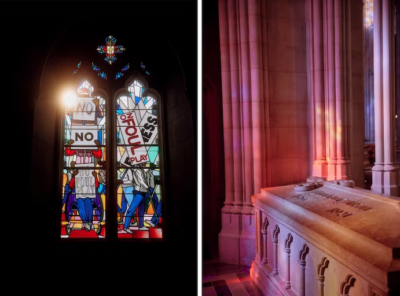 How we learn to see history: A case study at the National Cathedral. By Sarah Lewis / Wash Post
How we learn to see history: A case study at the National Cathedral. By Sarah Lewis / Wash Post
At left, newly installed stained glass by artist Kerry James Marshall at the National Cathedral in D.C. At right, President Woodrow Wilson’s tomb inside the cathedral. (Jared Soares for The Washington Post)
How do we tell the full story of who we are? How can we define the trajectory of a country founded on the tension between slavery and freedom? It is nearly impossible to put into one sentence. As soon as we try, we have left something out. To tell the history has required a way to articulate the unimaginable and the extraordinary at once, and this has required the arts to state what may never be said. To examine this history is to expose how we have learned not to see the fictions that legitimate racial injustice and inequity. The work of revision — of re-seeing — must continue. For where we once blocked our rightful view of one another, we now have the means to build windows. We can see the story tied to the representation all around us. The question is whether we still have the will. Read more
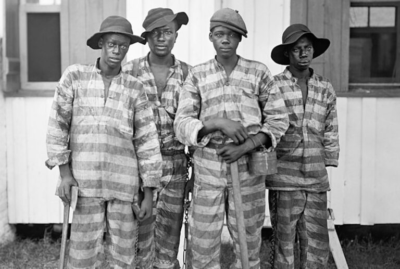 Convict Leasing in the Family. By Menika Dirkson / AAIHS
Convict Leasing in the Family. By Menika Dirkson / AAIHS
A chain gang of young African-American convicts in the Southern United States (Wikimedia Commons/Detroit Publishing Co.)
Convict leasing in South Carolina officially began in 1877, but the state approved convict labor as early as 1866. Against the backdrop of the Reconstruction era where a select few freedmen entered political positions, Black convicts, mostly formerly enslaved, were exploited, held captive, and forced into harsh labor conditions. Read more
 “Luther: Never Too Much” documentary to premiere at Sundance Film Festival. By
“Luther: Never Too Much” documentary to premiere at Sundance Film Festival. By
For more than four decades, Luther Vandross has been recognized for his silky tenor and doo-wop-inspired runs with tender lyrics about romantic love and joy. He sold more than 40 million records worldwide, 13 of his albums went platinum, and he became a solid favorite among Black listeners.
Still, the R&B superstar — known to fans simply as “Luther” or “Luffa” — wanted to grow his fanbase and achieve crossover success. Vandross’ commitment to music is celebrated in “Luther: Never Too Much,” the first full-length documentary to chronicle the life and career of the multitalented performer, who died in 2005 at age 54 following complications from a stroke two years prior. The film is directed by award-winning filmmaker Dawn Porter and is premiering as an official selection at this year’s Sundance Film Festival on Jan. 21. Read more
 Quinta Brunson is first Black woman to win best comedic actress Emmy in over 40 years. By
Quinta Brunson is first Black woman to win best comedic actress Emmy in over 40 years. By
Quinta Brunson took home an Emmy on Monday for best actress in a comedy series, becoming the first Black actress to win the category since 1981 when “The Jeffersons” star Isabel Sanford won.
Brunson won for her performance in ABC’s sitcom “Abbott Elementary,” which she also created and serves as a writer on. “Abbott Elementary” is a workplace comedy that follows a group of teachers at a public school in Philadelphia who, despite their lack of resources, work toward helping their students succeed. Read more
Sports
 Rising WTA Prodigy Hyped as the ‘Real Deal’ in American Tennis for Her Serena Wiliams-Inspired Flex at the Australian Open. By Prarishtha Prakash / Essentially Sports
Rising WTA Prodigy Hyped as the ‘Real Deal’ in American Tennis for Her Serena Wiliams-Inspired Flex at the Australian Open. By Prarishtha Prakash / Essentially Sports
It looks like Serena Williams finally has a successor on the court! Just like the 42-year-old American sensation has left fans in awe with her performances, another young player recently reminded the tennis community of Williams with her mannerisms.
A fan commented that Parks is one of the strong candidates to be the next Williams. He wrote, “Of all the “next serenas” that the American media has tried to promote since Williams’ retirement, Alycia is the one who best fits in terms of personality and appearance.” Read more
 From Harvard to Howard: He’s the rare college hoops eighth-year senior. By John Feinstein / Wash Post
From Harvard to Howard: He’s the rare college hoops eighth-year senior. By John Feinstein / Wash Post
 Black catchers in MLB are extinct but prospects can change that. By Bob Nightengale / USA Today
Black catchers in MLB are extinct but prospects can change that. By Bob Nightengale / USA Today
It’s the most stunning, appalling and numbing statistic in all of baseball.
It has been 20 years since there was an African-American everyday catcher in Major League Baseball. Major League Baseball has seen the Black population decline to just 6.1% on opening-day rosters this past year – the lowest percentage since 1955 – and no position has had a steeper decline than catcher. Read more
Site Information
Articles appearing in the Digest are archived on our home page. And at the top of this page register your email to receive notification of new editions of Race Inquiry Digest.
Click here for earlier Digests. The site is searchable by name or topic. See “search” at the top of this page.
About Race Inquiry and Race Inquiry Digest. The Digest is published on Mondays and Thursdays.
Use the customized buttons below to share the Digest in an email, or post to your Facebook, Linkedin or Twitter accounts.